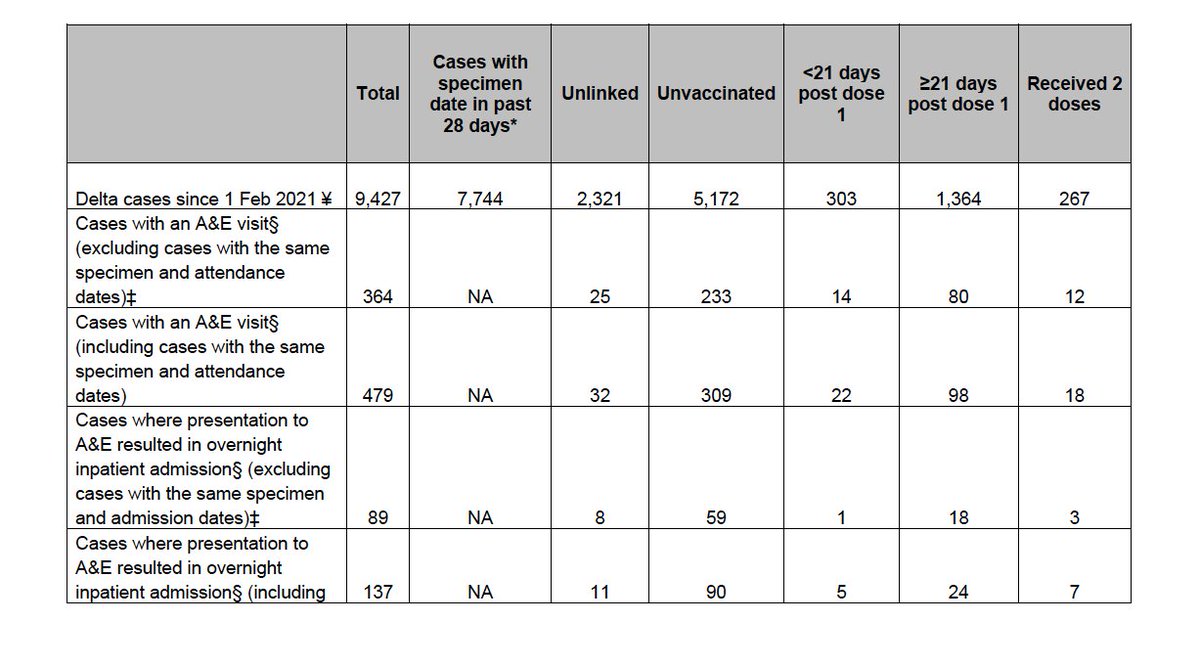
1/ It's pretty clear we need to expand #COVID19 3rd doses.
Vaccine effectiveness is still ⬆️protective against severe illness. There is evidence for waning VS infection.
Some want to give out 3rd doses like Halloween candy, others think it ends at 2. As always, details matter.
Vaccine effectiveness is still ⬆️protective against severe illness. There is evidence for waning VS infection.
Some want to give out 3rd doses like Halloween candy, others think it ends at 2. As always, details matter.
https://twitter.com/BogochIsaac/status/1446120626654044164
2/ A few thoughts:
-Some need 3rd doses now, but we all don't need 3rd doses now (see further below).
-Longer duration from last dose = higher prob of infection.
-Spacing out dose 1 & 2 (not done in USA/Israel) likely provides more robust protection.
bbc.in/3uWnXfA
-Some need 3rd doses now, but we all don't need 3rd doses now (see further below).
-Longer duration from last dose = higher prob of infection.
-Spacing out dose 1 & 2 (not done in USA/Israel) likely provides more robust protection.
bbc.in/3uWnXfA
3/
-The vaccines⬇️⬇️the risk of infection, but are not designed for sterilizing immunity. We knew this from the original clinical trials well before Delta emerged.
-Vaccines are phenomenal in preventing severe illness.
-Much more complex than "breakthrough infections" = boost.
-The vaccines⬇️⬇️the risk of infection, but are not designed for sterilizing immunity. We knew this from the original clinical trials well before Delta emerged.
-Vaccines are phenomenal in preventing severe illness.
-Much more complex than "breakthrough infections" = boost.
4/
-Want to really have the largest & most meaningful impact? Then focus on #COVID19 1st doses in the unvaccinated (locally & globally).
-Billions remain unvaccinated in low income countries. Ugh.
-Want to really have the largest & most meaningful impact? Then focus on #COVID19 1st doses in the unvaccinated (locally & globally).
-Billions remain unvaccinated in low income countries. Ugh.

5/
-Unclear risk of myocarditis after dose 3 in those at risk (e.g. men under 30). Would like to see more robust safety data here.
-3rd doses for Healthcare workers? For some. There are many men under 30. See point above. Hard to make 'blanket policy' when some have a ? risk.
-Unclear risk of myocarditis after dose 3 in those at risk (e.g. men under 30). Would like to see more robust safety data here.
-3rd doses for Healthcare workers? For some. There are many men under 30. See point above. Hard to make 'blanket policy' when some have a ? risk.
6/ The World Health Organization has called for a moratorium on wide-scale booster programs until 2022 given the huge global inequities.
Focused (rather than blanket) 3rd dose programs can still align with global goals.
cnb.cx/2YvW3vv
Focused (rather than blanket) 3rd dose programs can still align with global goals.
cnb.cx/2YvW3vv
7/
-With current data/local/global context, what makes sense now in 🇨🇦 for 3rd doses?
*65+ yrs
*Immunocompromised & several underlying medical conditions
*Long term care & congregate care setting
*Some HCW
(Eligibility can expand with time)
-With current data/local/global context, what makes sense now in 🇨🇦 for 3rd doses?
*65+ yrs
*Immunocompromised & several underlying medical conditions
*Long term care & congregate care setting
*Some HCW
(Eligibility can expand with time)
8/
Summary:
1st doses for all (eligible) now.
3rd doses for some now.
3rd doses for others later.
Still many unanswered questions & expect policy to adapt with emerging data.
Find the sweet spot where safety/equity/current data overlap...it's a moving target.
Fin.
Summary:
1st doses for all (eligible) now.
3rd doses for some now.
3rd doses for others later.
Still many unanswered questions & expect policy to adapt with emerging data.
Find the sweet spot where safety/equity/current data overlap...it's a moving target.
Fin.
Addendum: The observational studies reporting on waning immunity are far from perfect and very likely overestimate the degree of waning.
This needs better/more honest communication.
But this doesn’t mean waning isn’t occurring - it is.
This needs better/more honest communication.
But this doesn’t mean waning isn’t occurring - it is.
h/t @EpiEllie
• • •
Missing some Tweet in this thread? You can try to
force a refresh









